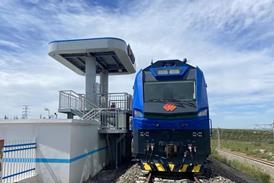Close menu
- Home
- News
- In depth
- Events
- Data
- Maps
- Tenders & Jobs
- Sponsored content
- Insights
Gauge-changing sleeping car for Baku – Istanbul route
By Railway Gazette International2016-09-30T15:37:00

AZERBAIJAN: The first of 30 coaches which Stadler Rail is building for use on overnight services on the future Baku – Tbilisi – Kars – Istanbul route was unveiled at InnoTrans 2016. Deliveries are scheduled to start this year and run until mid-2017.
Already have an account? LOG IN
To continue…
You’ve reached your limit of content for the month
Get enhanced access to Railway Gazette news and weekly newsletters.
Site powered by Webvision Cloud














